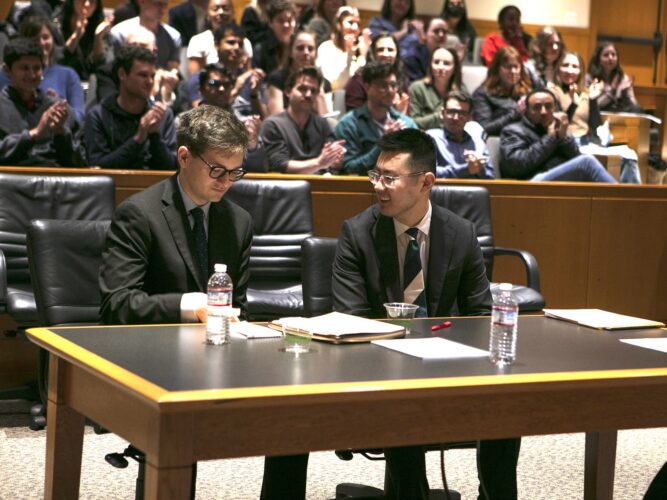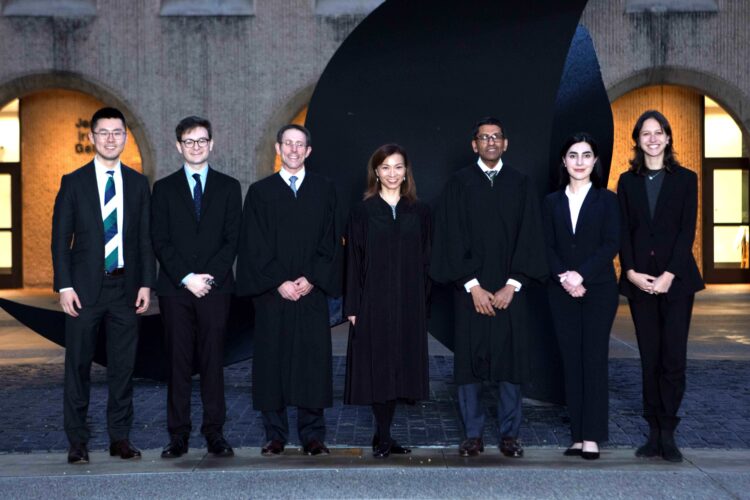Kirkwood Moot Court Announces 2024 Award Winners
An “obsession” with listening to recordings of past Supreme Court arguments helped Garrett Wen, JD ’24, take home awards for Best Oralist and Best Overall Team at the recent Marion Rice Kirkwood Moot Court Competition, the major annual moot court activity at Stanford Law School (SLS) since 1952. The internal SLS competition gives participating students the opportunity to brief and argue a real case before a hypothetical U.S. Supreme Court.
Two of the three judges for the final round of the competition on February 2 were SLS alumni—and former Kirkwood Moot Court finalists themselves—from the United States Court of Appeals for the District of Columbia: Chief Judge Srikanth “Sri” Srinivasan, JD/MBA ’95, and Florence Y. Pan, JD ’93. They were joined by Daniel A. Bress of the United States Court of Appeals for the Ninth Circuit.

Wen shared the Best Overall Team award with his friend and fellow Supreme Court Litigation Clinic student Graham Ambrose, JD ’24. He tied with Molly Shapiro, JD ’25, for the Best Oralist award and Shapiro and Nikta Shahbaz, JD ’25, shared the Best Overall Brief award. The competition is named for Marion Rice Kirkwood, who served as an SLS faculty member from 1912 to 1922 and as dean of the law school from 1922 to 1945. Moot Court is a for-credit course held across two quarters. The students brief their cases in the fall and then do the oral arguments round in the winter quarter.
“Listening to Supreme Court arguments is something I just enjoy doing for fun, in my spare time,” says Wen, who, after graduation, will join the Washington, D.C. law firm Williams & Connolly, known for its Supreme Court and appellate advocacy practice. “Some of my favorite advocates include Lisa Blatt (who has argued before SCOTUS more than any other woman), for whom I’ll be working next year, and then there are also our own Supreme Court Clinic instructors—Jeff Fisher, Easha Anand, and Pam Karlan—who have all recently argued before the Court. I listened to their arguments over and over, and I think that level of active listening really helped because I actually have very little public speaking experience.”
The competition begins with 20 teams of two students, half assigned to argue on behalf of petitioner and half for respondent. Successive elimination rounds winnow the group down to the finalists who, this year, went up against each other, in front of the panel of federal judges. This year’s case was Frasier v. Evans, 992 F.3d 1003 (10th Cir. 2021), in which a bystander recorded police violently assaulting a drug suspect, and then brought a civil rights action against the police for pressuring him to produce the video. Questions around qualified immunity for police officers were at the heart of the case.
For Ambrose, a highlight of the oral arguments was being on the receiving end of a hypothetical that Pan posed. She recently served as one of the presiding judges in United States v. Trump, which implicated the former president’s claims of immunity from prosecution. Her hypothetical for Ambrose bore a striking resemblance to a question she had recently posed to Trump’s lawyer, which had made international headlines: whether a former president could be immune from prosecution if he had previously ordered SEAL Team Six to assassinate a political rival.

“It was an unexpected moment of connection and levity,” Ambrose says. “I couldn’t help but smile as she asked me the question, since I had listened to the oral argument in United States v. Trump and immediately understood the allusion. Judge Pan saw my reaction and started to smile and laugh herself.”
Shaprio and Shahbaz had the added challenge of arguing “off brief” during the final round: the opposite side of the case than the one they briefed. “It is not an option to hide from the hard questions when you are arguing before some of the smartest legal minds,” Shapiro says, “so we had to push ourselves to think through the issues on a far deeper level. Almost as much fun as the argument itself were the conversations about the case that Nikta and I had with friends, faculty, and fellow students in the moot court program in preparation.”
SLS lecturer Randee Fenner (BA ’75), who has co-directed Kirkwood Moot Court with lecturer Lisa Pearson since 1987, says the competition “once again highlighted the incredible analytical and advocacy skills of our amazing students. Both teams were exceptional, thoughtfully answering incisive questions from an extremely challenging and well-prepared bench. We could not have asked for a better conclusion to the competition and are so very proud of not only the finalists but also all the students who participated.”
